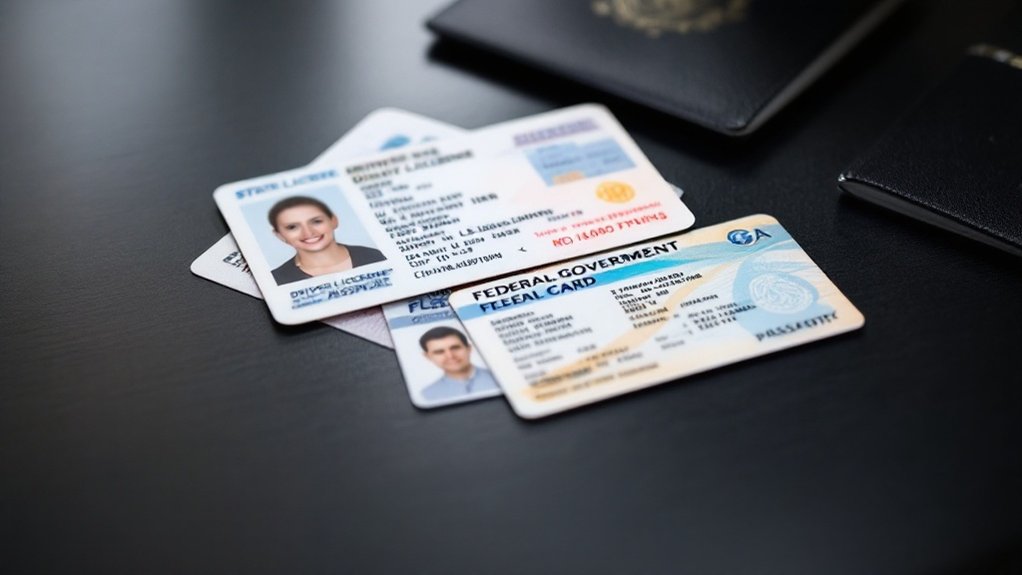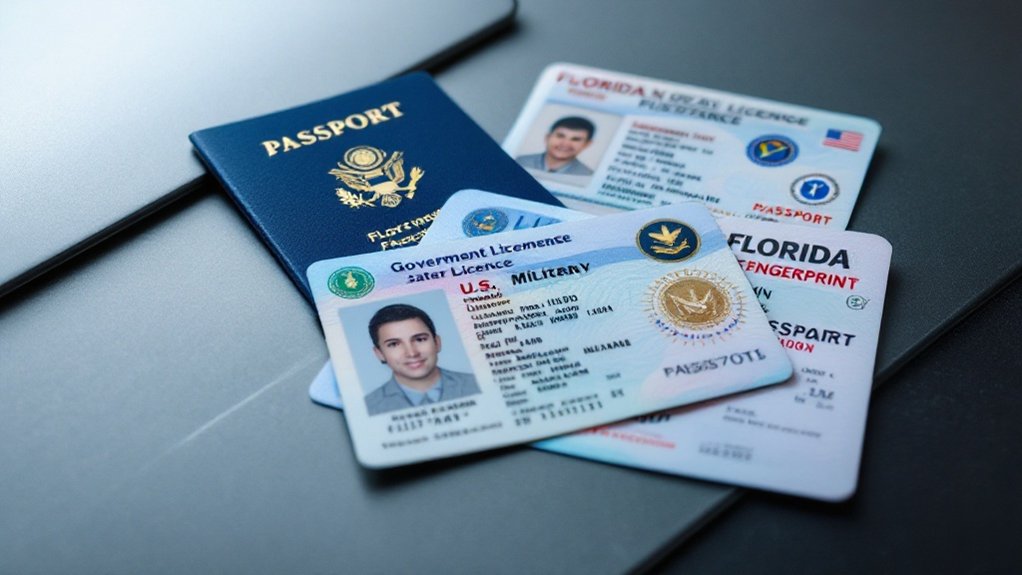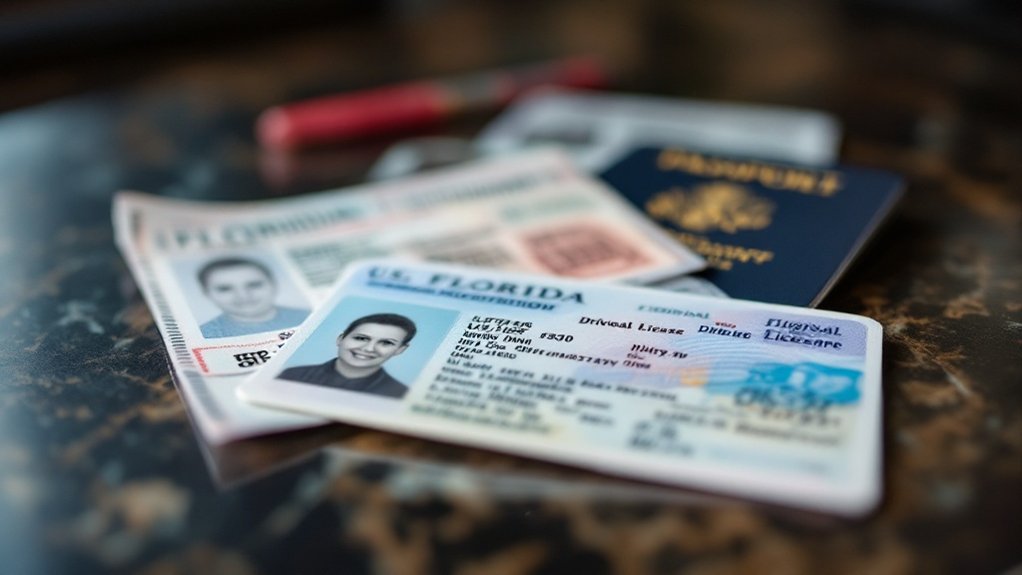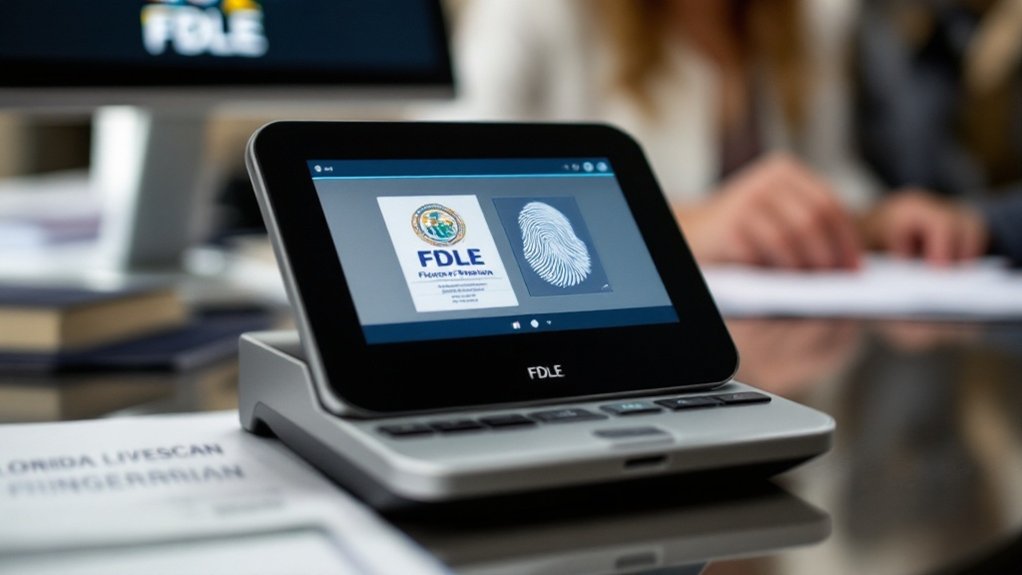When you undergo fingerprinting in Florida, you’re required to provide specific IDs to verify your identity accurately. Primary documents like a driver’s license or passport are essential, while secondary documents such as utility bills or a Social Security card validate your name and address. These documents guarantee compliance with state and federal regulations, secure data processing, and protect privacy rights. By understanding these requirements, you’ll gain insight into the broader context of fingerprinting in Florida.
Primary Identification Documents

When you’re preparing for fingerprinting in Florida, it’s necessary to have the right primary identification documents. You’ll need a government-issued photo ID, such as a state-issued driver’s license or non-driver ID card, which must match your current name and address. A U.S. passport or passport card is also acceptable. For military personnel, a military ID card or Department of Defense Common Access Card works. These IDs are crucial for verifying your identity and ensuring a smooth fingerprinting process. They must be valid or recently expired to be accepted. Additionally, during the fingerprinting process, Livescan technology is often used to capture fingerprints accurately and efficiently.
Secondary Identification Documents
When you’re preparing for fingerprinting in Florida, you’ll need to understand the role of secondary identification documents. These include a state/government-issued certificate of birth, Social Security card, and various immigration documents like the INS I-551 Resident Alien Card. You’ll also use supporting documents such as utility bills, voter registration cards, or vehicle registrations to validate your secondary IDs.
Secondary Identification Documents
In Florida, secondary identification documents play an essential role in verifying an individual’s identity and residency. You will need documents like utility bills, voter registration cards, and vehicle registrations to confirm your address. Social Security cards and certificates of citizenship are also used to support your primary ID. These documents must include your name and address, be issued by a government agency or recognized institution, and be current. Photocopies or scans are often acceptable. They support your primary identification by providing additional proof of who you are and where you live. Additionally, when undergoing fingerprinting for background checks, providing the correct ORI number is crucial to ensure that the results are processed by the appropriate state department.
Birth Certificates
Birth certificates serve as secondary identification documents in Florida’s fingerprinting process, helping to verify an individual’s date of birth and support primary IDs. They guarantee that the date of birth matches other records, preventing delays in fingerprint processing.
- Identity Verification: Confirm the individual’s identity when primary IDs are insufficient.
- Additional Documentation: Provide extra verification when primary IDs are questionable.
- Compliance: Help comply with legal requirements for accurate identification.
- Record Consistency: Guarantee consistency across different databases and identification documents.
Government Issuance Requirements

To undergo fingerprinting in Florida, you must provide specific government-issued identification documents. Primary IDs include state-issued driver’s licenses or non-driver ID cards, which are essential for verifying your identity. If you lack these, secondary documents like passports, military IDs, or social security cards can be used, but they must be supported by additional documentation.
The verification process requires your ID to match the name on your fingerprint application exactly. Compliance with legal standards is indispensable, as IDs must adhere to regulations for fingerprinting and background checks. This guarantees that your identity is accurately verified and that the process complies with state and federal laws. Additionally, fingerprint cards must meet the FBI regulations to ensure that all necessary information, including signatures and photographs, is properly included for accurate identification and background checks.
Photo Verification and Expiration Dates
When you undergo fingerprinting in Florida, photo verification plays an essential role in enhancing the security and accuracy of background checks. Photos are taken to visually confirm your identity, making the process more efficient. Including a photo with your fingerprint submission is optional but recommended, as it can streamline future checks.
- Photos are typically taken by the technician during fingerprinting.
- A valid government-issued ID is required for fingerprinting.
- Expired IDs may not be accepted, potentially delaying the process.
- Retaining photos can save time and money by avoiding future fingerprinting sessions. Additionally, the use of electronic fingerprinting technology ensures that the process is faster and more accurate, as it involves capturing fingerprints digitally rather than using ink.
Original Documents and Address Verification

Original documents play a pivotal role in the fingerprinting process in Florida, as they guarantee the accuracy and legitimacy of your identity. You will need government-issued IDs like state driver’s licenses or passports, and military IDs are also accepted. Foreign documents with photos can be used as well. For address verification, utility bills, voter registration cards, vehicle registrations, bank statements, and paycheck stubs are indispensable.
These documents help prevent fraud and necessitate compliance with regulations. Using original documents facilitates efficient processing and avoids delays or rejections. Incorrect or altered documents can lead to legal issues and additional costs, so it’s imperative to provide accurate and valid documentation.
Types of Fingerprinting and ID Requirements
In Florida, fingerprinting involves various types, each with specific purposes and ID requirements. You’ll need to understand these differences to navigate the process effectively. For instance, Criminal Background Checks are required for employment and licensing, while Live Scan Fingerprinting offers an efficient electronic method.
Some key aspects of fingerprinting in Florida include:
- State-Issued Driver’s License: A primary form of identification.
- U.S. Passport/Passport Card: Also accepted as a primary ID.
- Military Identification Card: Recognized for military personnel.
- Permanent Resident Card (I-551): Valid for non-citizens.
Purpose of Fingerprinting in Florida

Fingerprinting in Florida serves multiple critical purposes, primarily focusing on enhancing public safety and ensuring compliance with state regulations. It is used for criminal background checks, employment screening, and security clearances. Livescan fingerprinting is mandatory for professions like healthcare and education, ensuring employee integrity. Fingerprinting aids in identifying individuals and verifying their criminal histories, contributing to public safety by quickly identifying suspects.
As you undergo fingerprinting, you’ll notice it’s a digital process that captures high-resolution images efficiently. This technology reduces errors and is cost-effective, making it preferred by state agencies. It’s essential for maintaining workplace safety and is used by government agencies for various purposes.
Legal Compliance and Privacy Protections**
As you navigate the fingerprinting process in Florida, understanding the legal requirements and privacy protections is vital. Florida Statutes mandate that entities submitting fingerprints electronically must agree with the FDLE, safeguarding quality standards and privacy for applicants’ Personally Identifiable Information (PII).
- Privacy Act Compliance: Guarantees respect for privacy rights.
- Voluntary Disclosure: Providing fingerprints is generally voluntary.
- Right to Challenge: Individuals can challenge their criminal history records.
- Data Security: Fingerprint data is processed securely to protect personal information.
These measures guarantee that your data is handled responsibly and securely. Additionally, LiveScan devices used in this process must be obtained from FDLE-registered vendors to ensure compliance with state regulations.
Conclusion
As you undergo fingerprinting in Florida, specific IDs are required to guarantee a seamless process. Primary documents like driver’s licenses and passports serve as the foundation, while secondary documents like birth certificates and utility bills provide additional verification. This process is designed to maintain legal compliance and privacy protections, ensuring that your identity is accurately captured and safeguarded. It’s a delicate dance of documentation, where each piece plays a crucial role in securing your personal details.

